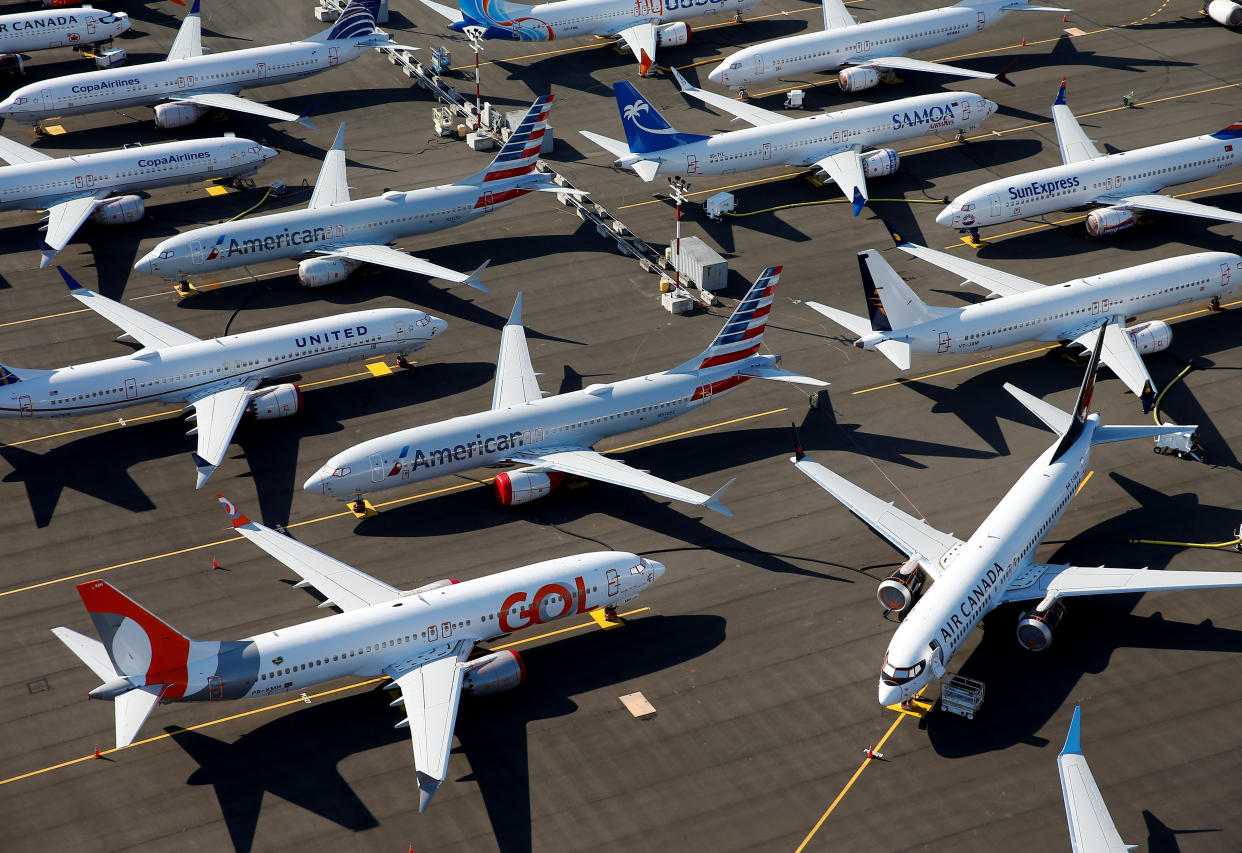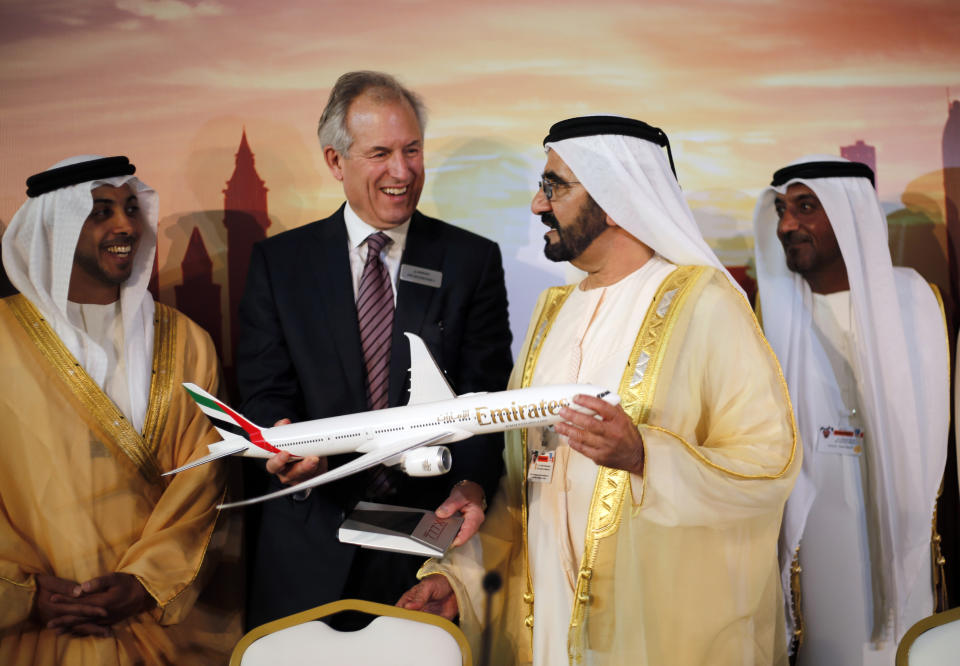Airlines worry FAA trust issues will further delay the new Boeing 777X

BERLIN - As the Boeing 737 MAX’s groundings extend deep into December, some airlines are beginning to worry that the regulatory problems may broaden to the 777X, possibly delaying deliveries.
The 737 MAX situation appears to be far from resolved. On Monday, American Airlines (AAL) extended groundings of the plane until Dec. 3, following United Airlines’ (UAL) extension for its planes to Dec. 19.
A source in the aviation industry familiar with the matter told Yahoo Finance that airlines are concerned that the FAA’s perceived ceding of safety oversight to Boeing will further risk the 777X’s on time deliveries.
The 777X is set to be “the world’s largest and most efficient twin-engine jet,” according to Boeing’s website, and the company’s flagship product. It’s set to be delivered in 2020 to seven airlines at first.
Two factors are in play. One is the concern that Boeing’s issues dealing with the 737 MAX scandal, after two fatal crashes, could affect its own timeline.
But an even greater fear is that the reciprocity between FAA and other governing bodies that certify airplanes could be reconsidered or re-evaluated following the crashes and controversy. Recently, sharp rhetoric from the European Union Aviation Safety Agency (EASA) suggests the relationship between it and the FAA has frayed, with the EASA’s executive director saying this week that the international regulators will want to have a second opinion after the FAA determines the 737 MAX can fly again.
A Boeing spokesperson didn’t comment on potential certification difficulties, but pointed to engine problems “putting pressure on the overall 777X test schedule and development timeline.”
In June, GE said it had to redesign an engine part for the 777X. Around that time customers like Emirates and Lufthansa said they were drawing up contingency plans to deal with delays, which increasingly appear as if they will be exercised.
The airplane manufacturer said it currently projects a first flight in early 2020, having pushed back the date multiple times from 2018 to 2019, and in July, to 2020.
“While we continue to target 2020 for first delivery of the 777[X]-9, the engine issue has added significant risk to the schedule,” said the Boeing spokesperson. “As with any development program, we are being thoughtful and deliberate, taking the time to get the details right with safety as our top priority. We will fly only when we are satisfied with the performance of the aircraft.”
Certification worries about the future of reciprocity
In July, reports emerged that that the FAA had ceded significant aspects of its certification to Boeing, passing off complex systems like the MCAS mechanism that was a factor in the crashes. This thrust the FAA’s previously shining reputation in doubt, and raised questions as to whether other regulators would continue to trust the American agency.
The FAA, the EASA, and other regulators will almost certainly end up on the same page. The question, however, is how long will it take?
It is extremely expensive to certify an airplane, and a new process in every jurisdiction would cripple airline manufacturers or make planes prohibitively expensive for everyone. Countries and airlines need two manufacturers, as Airbus and Boeing operate in a duopoly and a change would remove key competition that keeps costs in check.

An EASA spokesperson confirmed this goal to Yahoo Finance: “it is clear that we will continue to need a global approach — there cannot be different requirements in different parts of the world.”
This is a good sign for the future of reciprocity. But it could mean that the process could drag on, both for the 737 MAX re-certification but also potentially for future planes like the 777X, since the certification process itself is being examined.
In a statement, the FAA said it will work with all international safety regulators.
According to Boeing’s website, there are currently seven airlines expecting 777X deliveries: All Nippon, Cathay Pacific, Emirates, Etihad, Lufthansa, Qatar, and Singapore. Airlines did not respond to requests for comment.
EASA chief throws shade at FAA and Boeing
Reciprocity may win out in the long term, but the short term looks much shakier.
On Tuesday the EASA’s executive director Patrick Ky stoked unease in EU Parliament, and gave no timeline to resolution. A presentation posted on the EU Parliament’s website noted that the regulator was not satisfied with a key element of the 737 MAX situation.
But when the FAA deems the plane airworthy, it may not be good enough.
“It is very likely that international authorities will want a second opinion, or a further opinion,” Ky said, according to aviation trade publication AinOnline.
Ky said the EASA was among those on an international panel evaluating the FAA's delegating procedures, looking into Boeing’s role in its own certification. The director said he respects the FAA and its strong ethics, but called for a change in the American regulator’s methodology of delegating.
He added that the EASA would never have a similar situation, though he admitted they do delegate to manufacturers somewhat as well.
An FAA spokesperson said it welcomes scrutiny from safety experts and looks forward to the findings. But for its part, FAA officials have pointed out in the past that EASA delegates to a greater degree than the U.S. does.
“We continue to work with other international aviation safety regulators and will carefully consider all recommendations. The FAA will incorporate any changes that would improve our certification activities,” the FAA said, adding that the MAX certification program involved 110,000 hours of work by FAA personnel, and 297 test flights.
The relationship between the FAA and EASA, which are communicating frequently with each other and Boeing, has concerned other parties, like Airbus and the International Air Transport Association (IATA).
"With the 737 MAX we are a bit worried,” Alexandre de Juniac, IATA director general said to reporters this week. “We don't see the normal unanimity among international regulators that should be the case."
-
Ethan Wolff-Mann is a writer at Yahoo Finance focusing on consumer issues, personal finance, retail, airlines, and more. He is reporting from Berlin on the Arthur F. Burns fellowship from the International Center for Journaists. Follow him on Twitter @ewolffmann.
Americans are trying to invest in Denmark’s negative mortgages
Tech companies are trying to disrupt banks, and banks are ready
‘Flight shame’: A potential headwind for airlines in Europe
Apple Card might finally get people to use Apple Pay
Read the latest financial and business news from Yahoo Finance
Follow Yahoo Finance on Twitter, Facebook, Instagram, Flipboard, LinkedIn, YouTube, and reddit.

